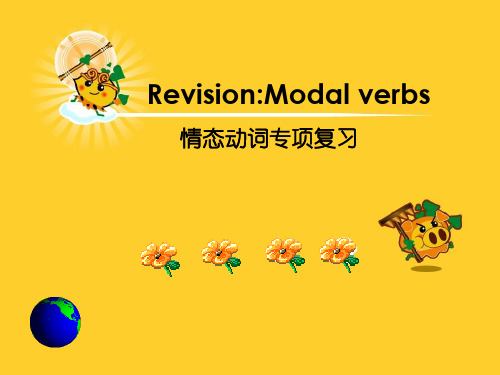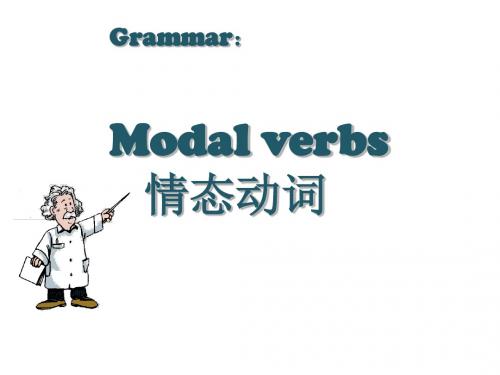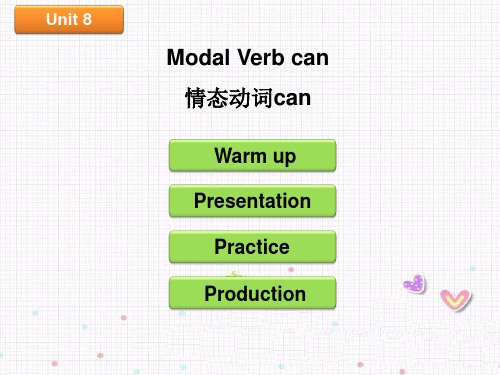公开课——情态动词ppt课件
合集下载
情态动词讲解精ppt课件

例句
will/would
详细描述:will 表示现在的意愿或 预测,would 表示过去的或虚拟 的意愿或预测。
1. I will help you with your project.(我会帮助你完成你的项 目。)
总结词:表示意愿或预测
例句
2. They would have gone to the party if they had known about it earlier.(如果他们早点 知道,他们就会去参加聚会。)
表示意愿
情态动词+动词原形,如 would like to go,表示 某人想要去。
形式变化
基本形式
情态动词的基本形式包括 现在时、过去时和将来时 。
过去式
情态动词的过去式通常是 在基本形式后面加-d或ed,如could have done 、should have done等。
将来时
情态动词的将来时通常是 在基本形式后面加-will或shall,如will be able to 、shall have to等。
may与might的区别与联系
总结词
may表示现在的许可或可能性;might表示过去的可能性或许可。
详细描述
may用于肯定句中,表示许可或可能性,例如“You may use this room.”(你可以使用这个房间。 )“The book may be in the library.”(这本书可能在图书馆里。)might表示过去的可能性,常 用于过去时态的句子中,例如“He might come tomorrow.”(他明天可能来。)
未必、很难说
She might not agree with us.
表示虚拟语气
will/would
详细描述:will 表示现在的意愿或 预测,would 表示过去的或虚拟 的意愿或预测。
1. I will help you with your project.(我会帮助你完成你的项 目。)
总结词:表示意愿或预测
例句
2. They would have gone to the party if they had known about it earlier.(如果他们早点 知道,他们就会去参加聚会。)
表示意愿
情态动词+动词原形,如 would like to go,表示 某人想要去。
形式变化
基本形式
情态动词的基本形式包括 现在时、过去时和将来时 。
过去式
情态动词的过去式通常是 在基本形式后面加-d或ed,如could have done 、should have done等。
将来时
情态动词的将来时通常是 在基本形式后面加-will或shall,如will be able to 、shall have to等。
may与might的区别与联系
总结词
may表示现在的许可或可能性;might表示过去的可能性或许可。
详细描述
may用于肯定句中,表示许可或可能性,例如“You may use this room.”(你可以使用这个房间。 )“The book may be in the library.”(这本书可能在图书馆里。)might表示过去的可能性,常 用于过去时态的句子中,例如“He might come tomorrow.”(他明天可能来。)
未必、很难说
She might not agree with us.
表示虚拟语气
《情态动词》PPT课件

work our this problem. 如果你睡个好觉,那么你就能做出这个题目。 3、表示过去的能力: could表示过去一般的能力, 但不表示做或未做某事;
was/ were able to表示过去有能力并且成功地做了某事, 相当于managed to do something/ succeeded in doing something;
• Mr. Bush is on time for everything. How can it be that he was late for the opening ceremony? (表疑惑、惊讶)
表示请求、允许、允诺
1. 当对方是决策者时,你代表你(们)自己(I, We),或代表第三者(he,she,they)向对方 (you)请示或提出建议时用:
Revision:Modal verbs
情态动词专项复习
How many modal verbs
do you remember?
(情态动词)
一,常见的情态动词有:can, could, may, might ,must, shall, should, will, would, need, have to等
4、具有情态动词的某些特征的有:have(had) to, used to.
情态动词的特征
1、有一定的词义,但不能单独作谓语,它们要和行 为动词或连系动词连用,构成谓语。
2、适用于主语的各种人称和数 have to例外,主语 是第三人称单数时,要用has to)。如:
We/ He must work hard. 我们/他一定要努力工作。 I have to walk home. 我得步行回家。 He has to walk home. 他得步行回家。
was/ were able to表示过去有能力并且成功地做了某事, 相当于managed to do something/ succeeded in doing something;
• Mr. Bush is on time for everything. How can it be that he was late for the opening ceremony? (表疑惑、惊讶)
表示请求、允许、允诺
1. 当对方是决策者时,你代表你(们)自己(I, We),或代表第三者(he,she,they)向对方 (you)请示或提出建议时用:
Revision:Modal verbs
情态动词专项复习
How many modal verbs
do you remember?
(情态动词)
一,常见的情态动词有:can, could, may, might ,must, shall, should, will, would, need, have to等
4、具有情态动词的某些特征的有:have(had) to, used to.
情态动词的特征
1、有一定的词义,但不能单独作谓语,它们要和行 为动词或连系动词连用,构成谓语。
2、适用于主语的各种人称和数 have to例外,主语 是第三人称单数时,要用has to)。如:
We/ He must work hard. 我们/他一定要努力工作。 I have to walk home. 我得步行回家。 He has to walk home. 他得步行回家。
情态动词专题知识公开课获奖课件

第7页
②在予以他人许可时,常用can,但有时也用may。不能用 might。
-May I play basketball this afternoon? 今天下午我可以打篮球吗? -Yes,you may. 行,可以。
第8页
(2)表达也许性 may和might表达也许性时,可以对目前、过去或未来进行 推测。 Peter may e with us tonight,but he isn't sure yet. 彼得今晚也许和我们一起来,但他还没确定。 He might be studying in the classroom. 他也许正在教室里学习。
用于必定句,表示对
taken the other road.It might have
过去没有做某事遗憾,意思 been quicker.可能我们本应走另一
should/ou 为“原来能够……(但实际 条路,那样可能更加快些。
第17页
(3)用于法律、公约、约定等正式条文,重要用于第三人称。 Students shall remain in their seats until all the papers have been collected. 试卷所有收回后学生方可离开座位。
第18页
5. will和would使用措施 作情态动词will,would与作助动词will,would多种形式相 似。 (1)表达自愿做或积极提出做什么,如意志、愿望或决心等。 would用于过去状况。
第14页
The TV set is broken. I have to buy a new one. 电视机坏了。我不得不再买台新。 The students will have to know how to use the puters. 学生将必须理解怎样使用电脑。 He had to go,because his mother was ill. 他不得不离开,由于他母亲病了。
②在予以他人许可时,常用can,但有时也用may。不能用 might。
-May I play basketball this afternoon? 今天下午我可以打篮球吗? -Yes,you may. 行,可以。
第8页
(2)表达也许性 may和might表达也许性时,可以对目前、过去或未来进行 推测。 Peter may e with us tonight,but he isn't sure yet. 彼得今晚也许和我们一起来,但他还没确定。 He might be studying in the classroom. 他也许正在教室里学习。
用于必定句,表示对
taken the other road.It might have
过去没有做某事遗憾,意思 been quicker.可能我们本应走另一
should/ou 为“原来能够……(但实际 条路,那样可能更加快些。
第17页
(3)用于法律、公约、约定等正式条文,重要用于第三人称。 Students shall remain in their seats until all the papers have been collected. 试卷所有收回后学生方可离开座位。
第18页
5. will和would使用措施 作情态动词will,would与作助动词will,would多种形式相 似。 (1)表达自愿做或积极提出做什么,如意志、愿望或决心等。 would用于过去状况。
第14页
The TV set is broken. I have to buy a new one. 电视机坏了。我不得不再买台新。 The students will have to know how to use the puters. 学生将必须理解怎样使用电脑。 He had to go,because his mother was ill. 他不得不离开,由于他母亲病了。
情态动词语法 ppt课件

ppt课件 3
(3) 表示客观可能性即推测用法,多用于否定句和疑问句中, could只表示可能性比can小,不表时态。(否定推测) —Who is that man? Can it be your uncle? —No, it can’t be him. (4) can 也用在肯定陈述句中,表示理论上的可能性,意为“有 时可能会” Anybody can make mistakes. Even top students can make mistakes in the exam. 即使优秀学生在考试中也可能会出错。
ppt课件
14
(3)shall用在主语是第三人称的陈述句中,表示条约,规章,法令 等文件中表示义务或规定, 常用于官方文件中,表明具有法律效 力。(而should表示应该,义务)。 All payments shall be paid by the end of the month. 本月底所有款项必须付清。 No person shall carry a mobil phone into the examination room during the College Extrance Examination.
ppt课件 7
(2)may和might的用法
1. may和might表示请求、许可。 表示征求同意和允许,表征求同意时,might比may的语气更委 婉一些,否定回答时要用mustn’t表示“不可以”、“禁止”、“阻止” 之意。 may表示“允许”,否定形式为mustn't/can't,表示“禁止、不允 许、不可以”如: You may keep the book for a week. 这本书你可以保留一星期。 — Might I use your pen? — Yes, you may/can. —No, you mustn't/can't.
(3) 表示客观可能性即推测用法,多用于否定句和疑问句中, could只表示可能性比can小,不表时态。(否定推测) —Who is that man? Can it be your uncle? —No, it can’t be him. (4) can 也用在肯定陈述句中,表示理论上的可能性,意为“有 时可能会” Anybody can make mistakes. Even top students can make mistakes in the exam. 即使优秀学生在考试中也可能会出错。
ppt课件
14
(3)shall用在主语是第三人称的陈述句中,表示条约,规章,法令 等文件中表示义务或规定, 常用于官方文件中,表明具有法律效 力。(而should表示应该,义务)。 All payments shall be paid by the end of the month. 本月底所有款项必须付清。 No person shall carry a mobil phone into the examination room during the College Extrance Examination.
ppt课件 7
(2)may和might的用法
1. may和might表示请求、许可。 表示征求同意和允许,表征求同意时,might比may的语气更委 婉一些,否定回答时要用mustn’t表示“不可以”、“禁止”、“阻止” 之意。 may表示“允许”,否定形式为mustn't/can't,表示“禁止、不允 许、不可以”如: You may keep the book for a week. 这本书你可以保留一星期。 — Might I use your pen? — Yes, you may/can. —No, you mustn't/can't.
情态动词ppt课件市公开课获奖课件省名师示范课获奖课件

I don’t like this TV set. We must buy a new one. There was no more bus. They had to walk home.
• (2) must旳否定形式mustn’t表达禁止, 意思是“不能,不许”。例如:
• (2023上海春)When I was young, I was told that I ______ play with matches
B. it is used to
• C. it was used to
D. it used to be
• 【答案】A D
(三)情态动词+have done
• must表达对某人某事旳猜测;对过去发生旳 事情作肯定判断用must have done
There is nobody here. They must have all gone home.
• can用于肯定句中表达一种理论上旳可能性, 并不牵涉是否真旳会发生;
• The road can be blocked. • could用于肯定句中,语气比can更弱。
• (4)may (not) / might (not)体现一种不太把 握旳推测,意为“或许,可能”;might旳 语气比may较婉转.
• A. might B. should C. could D. would
• 【答案】D
• (2) would表达过去倾向性或习惯性旳动作。 used to 也有这一使用方法,但used to即 可用来体现过去旳习惯性旳动作,也可用 来表达过去旳状态。例如:
• ① (NMET1996上海)When he was there, he ___ go to that coffee shop at the corner after work every day.
• (2) must旳否定形式mustn’t表达禁止, 意思是“不能,不许”。例如:
• (2023上海春)When I was young, I was told that I ______ play with matches
B. it is used to
• C. it was used to
D. it used to be
• 【答案】A D
(三)情态动词+have done
• must表达对某人某事旳猜测;对过去发生旳 事情作肯定判断用must have done
There is nobody here. They must have all gone home.
• can用于肯定句中表达一种理论上旳可能性, 并不牵涉是否真旳会发生;
• The road can be blocked. • could用于肯定句中,语气比can更弱。
• (4)may (not) / might (not)体现一种不太把 握旳推测,意为“或许,可能”;might旳 语气比may较婉转.
• A. might B. should C. could D. would
• 【答案】D
• (2) would表达过去倾向性或习惯性旳动作。 used to 也有这一使用方法,但used to即 可用来体现过去旳习惯性旳动作,也可用 来表达过去旳状态。例如:
• ① (NMET1996上海)When he was there, he ___ go to that coffee shop at the corner after work every day.
情态动词语法讲解PPT课件

2表示“许可”和“不许”
a)请求对方“许可”可用can, could, may, might.
may/might较正式,could/might较委婉
表示给予“许可”通常用can/may,而不用 could/might
Could I use your phone? Yes, of course you can. Might I trouble you for a light? You may indeed.
表示将来的“必须”,常用have to的一定 形式(will/shall have to) 比较:
•We must do it again.(表示现在)
•We’ll have to do it again.(表示将来)
•表示过去的“必须”,常用had to
•I had to leave at six yesterday.
•They must be home by now.(他们现在一定到家了)
will/would表示“推测”可有三种情况
1)对特定事态的推测
A: Who’s that man over there? B: That will be George, no doubt. C: That would be George, I except.
• Can they have missed the bus?
• Yes, they may have.
may not重音落在助动词上,表示 “不可能”,重音落在否定词上,表 示“不许可” , 比较:
•He may not go tomorrow.
•He may not go tomorrow.
•所以在书面语中,表示“不可能” 常用can’t
小学英语语法课件-情态动词can (共34张PPT) 全国通用

是的,可以。而且你还可以吃些蛋糕。 Birds can fly very high.
Hippos can’t fly and walk.
Lucy不可能在教室里面。
Presentation Sentences
Ostcrichacnan在’t fl句y. 子中表示允许,意为“可以” ,在口语中可以代替may。
Presentation Sentences
Can you please lend me your car? 你能借给我你的车用用吗? Could you help me with my English? 你能帮助我学英语吗?
can在句中表示请求,常用于“Can/Could you…?”句式。 can的过去式could用于现在时,可是语气更委婉,更客气。
What can bats do?
What can it do?
What can hippos do?
Can I come in ? 我可以进来吗? Can / Can’t I sit down?
Presentation Sentences
Dolphins can jump high and do tricks.
Practice Oral Practice 表示请求和许可:
我现在可以走了吗? 是的,可以。 不,不可以。
_C__a_n__ I go now? — Yes, you ___c_a_n_____. — No, you ___c_a_n_’_t____.
表示客观可能性:
Lucy不可能在教室里面。 Lucy _c_a_n_’_t___ be in the classroom.
— Can / Can’t he speak Japanese? — Yes, he can / can’t, but not well.
我的公开课情态动词课件

2. —What’s the name of the book? —Khulaifi. _________ I spell it for you? A. Shall B. Would C. Can D. Might
情态动词表必要性
• must • need
高考真题演练
must 表“必须”
mustn’t 禁止
A. might B. must C. would D. can
3. What do you mean, there are only ten tickets? There ______ be twelve.
A. should B. would C. will D. shall
4. It is usually warm in my hometown in March, but it _____ be rather cold sometimes.
1. 不必须
don’t have to needn’t do
don’t need to
2. must还可表示“偏偏、偏要” e.g. Must you make so much noise?
• You ___ buy a gift, but you can if you want to.
• must
1. 常用于否定句或疑问句。 e.g. You can’t be hungry already — you had
lunch only two hours ago!
2. can用于肯定句中表示理论上的可能性,并不 牵涉是否真的会发生
e.g. You can hurt yourself if you play in the street.
A. must B. can C. should D. would
- 1、下载文档前请自行甄别文档内容的完整性,平台不提供额外的编辑、内容补充、找答案等附加服务。
- 2、"仅部分预览"的文档,不可在线预览部分如存在完整性等问题,可反馈申请退款(可完整预览的文档不适用该条件!)。
- 3、如文档侵犯您的权益,请联系客服反馈,我们会尽快为您处理(人工客服工作时间:9:00-18:30)。
高中英语语法复习
1
一、情情态态动词动表词能力语法(目能录够)
二、情态动词表请求、允许 (能不能) 三、情态动词表必要性 (必须) 四、情态动词表推测 (可能)
五、情态动词+have done
2
情态动词表能力
11.. cIacnan表/ a示m现a在ble的t能o s力wim. 22.. cIocuoludld表/ 示wa过s 去ab的le能to力climb a tree when I
3. used to do “过去常常,强调现在不了” would表示“过去常常”;
6
1. When he was there, he ___ go to that coffee shop at the corner every day.
A. would
B. should
C. had better
mustn’t 禁止
1. 不必须
don’t have to needn’t do
don’t need to
2. must还可表示“偏偏、偏要” e.g. Must you make so much noise?
9
1. You ___ buy a gift, but you can if you want to.
10
情态动词表推测
可能性的强弱层次
must > should/ought to > can/could >
may/might
高考真题演练
11
must表示推测
1. 可能性最强,只能用于肯定句 e.g. That must be my pen.
2. must ---- 很可能
can’t ---- 不可能
A. might B. must C. would D. can
16
3. What do you mean, there are only ten tickets? There ______ be twelve.
A. should B. would C. will D. shall
14
may/ might表示推测
1. can not 不可能 may not 可能不
2. may well “极有可能” e.g. Liza may well not want to go on the trip
--- she hates traveling.
3. may/ might as well “不妨” e.g. You may as well stay for dinner.
A. must
B. mustn’t
C. have to
D. don’t have to
2. When I was young, I was told that I ______ play with fire.
A. wouldn't B. needn't C. mustn't D. daren't
3. - May I smoke here ? - If you __, choose a seat in the smoking area. A. should B. could C. may D. must
He shall leave the house at once. The sign reads: No person shall smoke here!
5
will would
1. 用于向第二人称,征求对方意见。 e.g. Would you please open the door?
2. 表示个人主观意愿。 e.g. I will help you anytime.
15
1. That
be Ann’s husband, for I am
sure that he doesn’t wear glasses.
A. can’t
B. may not
C. mustn’t
D. needn’t
2. - Good morning. I got an appointment with Miss Smith yesterday. - Ah, you ______ be Mr. Peter.
D. might
2. —What’s the name of the book? —Khulaifi. _________ I spell it for you? A. Shall B. Would C. Can D. Might
7
情态动词表必要性
• must • need 高考真题演练
8
must 表“必须”
was a child.
3. be able to 表能力,可用于多种时态 3. I will be able to swim next week.
4. be able to 强调成功地做了某事 4. The fire spread through the hotel very
quickly but everyone was able to get out.
3
情态动词表请求、允许
• shall • will、would
高考真题演练
4
shall
1. 用于第一、三人称 ,征求对方意见。 e.g. Shall we begin our class?
Shall he go now?
2. 用于提出命令、允诺,或用于法律、规定 e.g. You shall get my book on Sunday.
e.g. That can’t be my pen.
12
should / ought to表示推测
1. 根据经验的推测,“应当、应该” e.g. You photos should be ready by 12:00. 2. 表示“竟然”,带有感情色彩。 e.g. It is strange that you should like him.
13
Hale Waihona Puke an /could 表示推测1. 常用于否定句或疑问句。 e.g. You can’t be hungry already — you had
lunch only two hours ago!
2. can用于肯定句中表示理论上的可能性,并不 牵涉是否真的会发生
e.g. You can hurt yourself if you play in the street.
1
一、情情态态动词动表词能力语法(目能录够)
二、情态动词表请求、允许 (能不能) 三、情态动词表必要性 (必须) 四、情态动词表推测 (可能)
五、情态动词+have done
2
情态动词表能力
11.. cIacnan表/ a示m现a在ble的t能o s力wim. 22.. cIocuoludld表/ 示wa过s 去ab的le能to力climb a tree when I
3. used to do “过去常常,强调现在不了” would表示“过去常常”;
6
1. When he was there, he ___ go to that coffee shop at the corner every day.
A. would
B. should
C. had better
mustn’t 禁止
1. 不必须
don’t have to needn’t do
don’t need to
2. must还可表示“偏偏、偏要” e.g. Must you make so much noise?
9
1. You ___ buy a gift, but you can if you want to.
10
情态动词表推测
可能性的强弱层次
must > should/ought to > can/could >
may/might
高考真题演练
11
must表示推测
1. 可能性最强,只能用于肯定句 e.g. That must be my pen.
2. must ---- 很可能
can’t ---- 不可能
A. might B. must C. would D. can
16
3. What do you mean, there are only ten tickets? There ______ be twelve.
A. should B. would C. will D. shall
14
may/ might表示推测
1. can not 不可能 may not 可能不
2. may well “极有可能” e.g. Liza may well not want to go on the trip
--- she hates traveling.
3. may/ might as well “不妨” e.g. You may as well stay for dinner.
A. must
B. mustn’t
C. have to
D. don’t have to
2. When I was young, I was told that I ______ play with fire.
A. wouldn't B. needn't C. mustn't D. daren't
3. - May I smoke here ? - If you __, choose a seat in the smoking area. A. should B. could C. may D. must
He shall leave the house at once. The sign reads: No person shall smoke here!
5
will would
1. 用于向第二人称,征求对方意见。 e.g. Would you please open the door?
2. 表示个人主观意愿。 e.g. I will help you anytime.
15
1. That
be Ann’s husband, for I am
sure that he doesn’t wear glasses.
A. can’t
B. may not
C. mustn’t
D. needn’t
2. - Good morning. I got an appointment with Miss Smith yesterday. - Ah, you ______ be Mr. Peter.
D. might
2. —What’s the name of the book? —Khulaifi. _________ I spell it for you? A. Shall B. Would C. Can D. Might
7
情态动词表必要性
• must • need 高考真题演练
8
must 表“必须”
was a child.
3. be able to 表能力,可用于多种时态 3. I will be able to swim next week.
4. be able to 强调成功地做了某事 4. The fire spread through the hotel very
quickly but everyone was able to get out.
3
情态动词表请求、允许
• shall • will、would
高考真题演练
4
shall
1. 用于第一、三人称 ,征求对方意见。 e.g. Shall we begin our class?
Shall he go now?
2. 用于提出命令、允诺,或用于法律、规定 e.g. You shall get my book on Sunday.
e.g. That can’t be my pen.
12
should / ought to表示推测
1. 根据经验的推测,“应当、应该” e.g. You photos should be ready by 12:00. 2. 表示“竟然”,带有感情色彩。 e.g. It is strange that you should like him.
13
Hale Waihona Puke an /could 表示推测1. 常用于否定句或疑问句。 e.g. You can’t be hungry already — you had
lunch only two hours ago!
2. can用于肯定句中表示理论上的可能性,并不 牵涉是否真的会发生
e.g. You can hurt yourself if you play in the street.
